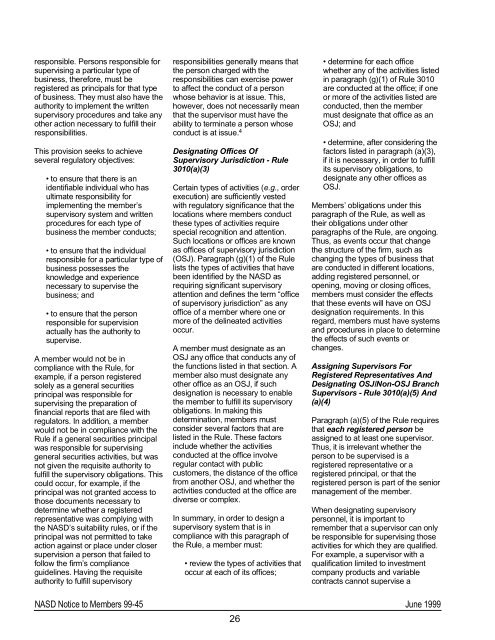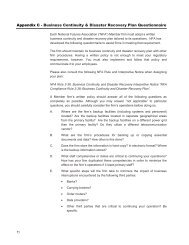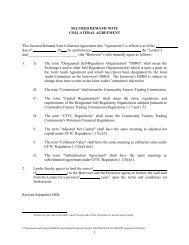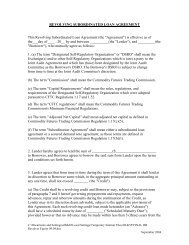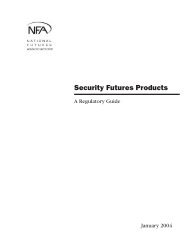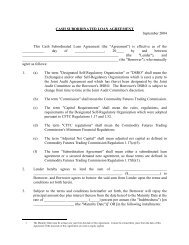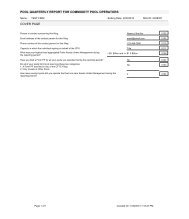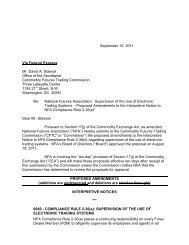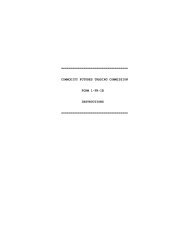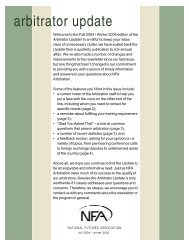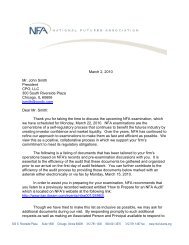NASD Notice to Members 99-45 - National Futures Association
NASD Notice to Members 99-45 - National Futures Association
NASD Notice to Members 99-45 - National Futures Association
You also want an ePaper? Increase the reach of your titles
YUMPU automatically turns print PDFs into web optimized ePapers that Google loves.
esponsible. Persons responsible for<br />
supervising a particular type of<br />
business, therefore, must be<br />
registered as principals for that type<br />
of business. They must also have the<br />
authority <strong>to</strong> implement the written<br />
supervisory procedures and take any<br />
other action necessary <strong>to</strong> fulfill their<br />
r e s p o n s i b i l i t i e s .<br />
This provision seeks <strong>to</strong> achieve<br />
several regula<strong>to</strong>ry objectives:<br />
• <strong>to</strong> ensure that there is an<br />
i d e n t i fiable individual who has<br />
ultimate responsibility for<br />
implementing the member’s<br />
supervisory system and written<br />
procedures for each type of<br />
business the member conducts;<br />
• <strong>to</strong> ensure that the individual<br />
responsible for a particular type of<br />
business possesses the<br />
knowledge and experience<br />
necessary <strong>to</strong> supervise the<br />
business; and<br />
• <strong>to</strong> ensure that the person<br />
responsible for supervision<br />
actually has the authority <strong>to</strong><br />
supervise.<br />
A member would not be in<br />
compliance with the Rule, for<br />
example, if a person registered<br />
solely as a general securities<br />
principal was responsible for<br />
supervising the preparation of<br />
financial reports that are filed with<br />
regula<strong>to</strong>rs. In addition, a member<br />
would not be in compliance with the<br />
Rule if a general securities principal<br />
was responsible for supervising<br />
general securities activities, but was<br />
not given the requisite authority <strong>to</strong><br />
f u l fill the supervisory obligations. This<br />
could occur, for example, if the<br />
principal was not granted access <strong>to</strong><br />
those documents necessary <strong>to</strong><br />
determine whether a registered<br />
representative was complying with<br />
the <strong>NASD</strong>’s suitability rules, or if the<br />
principal was not permitted <strong>to</strong> take<br />
action against or place under closer<br />
supervision a person that failed <strong>to</strong><br />
follow the firm’s compliance<br />
guidelines. Having the requisite<br />
authority <strong>to</strong> fulfill supervisory<br />
responsibilities generally means that<br />
the person charged with the<br />
responsibilities can exercise power<br />
<strong>to</strong> affect the conduct of a person<br />
whose behavior is at issue. This,<br />
however, does not necessarily mean<br />
that the supervisor must have the<br />
ability <strong>to</strong> terminate a person whose<br />
conduct is at issue. 4<br />
Designating Offices Of<br />
Supervisory Jurisdiction - Rule<br />
3 0 1 0 ( a ) ( 3 )<br />
Certain types of activities (e . g ., order<br />
execution) are sufficiently vested<br />
with regula<strong>to</strong>ry significance that the<br />
locations where members conduct<br />
these types of activities require<br />
special recognition and attention.<br />
Such locations or offices are known<br />
as offices of supervisory jurisdiction<br />
(OSJ). Paragraph (g)(1) of the Rule<br />
lists the types of activities that have<br />
been identified by the <strong>NASD</strong> as<br />
requiring significant supervisory<br />
attention and defines the term “offic e<br />
of supervisory jurisdiction” as any<br />
o f fice of a member where one or<br />
more of the delineated activities<br />
o c c u r .<br />
A member must designate as an<br />
OSJ any office that conducts any of<br />
the functions listed in that section. A<br />
member also must designate any<br />
other office as an OSJ, if such<br />
designation is necessary <strong>to</strong> enable<br />
the member <strong>to</strong> fulfill its supervisory<br />
obligations. In making this<br />
determination, members must<br />
consider several fac<strong>to</strong>rs that are<br />
listed in the Rule. These fac<strong>to</strong>rs<br />
include whether the activities<br />
conducted at the office involve<br />
regular contact with public<br />
cus<strong>to</strong>mers, the distance of the offic e<br />
from another OSJ, and whether the<br />
activities conducted at the office are<br />
diverse or complex.<br />
In summary, in order <strong>to</strong> design a<br />
supervisory system that is in<br />
compliance with this paragraph of<br />
the Rule, a member must:<br />
• review the types of activities that<br />
occur at each of its offic e s ;<br />
• determine for each offic e<br />
whether any of the activities listed<br />
in paragraph (g)(1) of Rule 3010<br />
are conducted at the office; if one<br />
or more of the activities listed are<br />
conducted, then the member<br />
must designate that office as an<br />
OSJ; and<br />
• determine, after considering the<br />
fac<strong>to</strong>rs listed in paragraph (a)(3),<br />
if it is necessary, in order <strong>to</strong> fulfil l<br />
its supervisory obligations, <strong>to</strong><br />
designate any other offices as<br />
O S J .<br />
<strong>Members</strong>’ obligations under this<br />
paragraph of the Rule, as well as<br />
their obligations under other<br />
paragraphs of the Rule, are ongoing.<br />
Thus, as events occur that change<br />
the structure of the firm, such as<br />
changing the types of business that<br />
are conducted in different locations,<br />
adding registered personnel, or<br />
opening, moving or closing offic e s ,<br />
members must consider the effects<br />
that these events will have on OSJ<br />
designation requirements. In this<br />
regard, members must have systems<br />
and procedures in place <strong>to</strong> determine<br />
the effects of such events or<br />
c h a n g e s .<br />
Assigning Supervisors For<br />
Registered Representatives And<br />
Designating OSJ/Non-OSJ Branch<br />
Supervisors - Rule 3010(a)(5) And<br />
(a)(4)<br />
Paragraph (a)(5) of the Rule requires<br />
that e a c h r e g i s t e r e dp e r s o nb e<br />
assigned <strong>to</strong> at least one supervisor.<br />
Thus, it is irrelevant whether the<br />
person <strong>to</strong> be supervised is a<br />
registered representative or a<br />
registered principal, or that the<br />
registered person is part of the senior<br />
management of the member.<br />
When designating supervisory<br />
personnel, it is important <strong>to</strong><br />
remember that a supervisor can only<br />
be responsible for supervising those<br />
activities for which they are qualifie d .<br />
For example, a supervisor with a<br />
q u a l i fication limited <strong>to</strong> investment<br />
company products and variable<br />
contracts cannot supervise a<br />
<strong>NASD</strong> <strong>Notice</strong> <strong>to</strong> <strong>Members</strong> <strong>99</strong>-<strong>45</strong> June 1<strong>99</strong>9<br />
26


